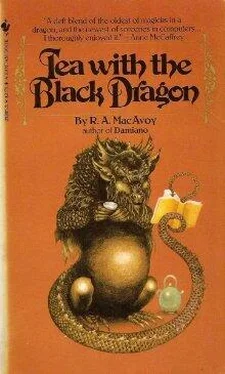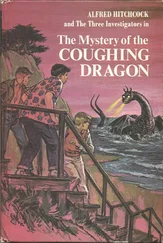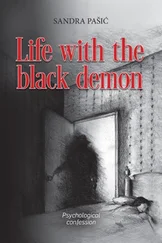Whose words? Who had said that? Long’s distracted mind pursued the question. Donne? No. Not like Donne. They were from a poem of Eliot’s. Or… were they the Formosan’s? The old man in the rain. Rain again… Whatever, they made no sense. Didn’t help at all. Never had. Words.
What would help? He needed… rest. There were so many miseries, crowding him close. Pain, thirst, cold, worry, loss. It hurt to think. It hurt to breathe.
Failure.
Suddenly it occurred to Mayland Long that he didn’t know what to do next. He couldn’t remember. Staring into the darkness, broken only by the pale arc of the steering wheel before him, he shuddered.
It was rest he needed, he told himself. He would regain both memory and strength if he could rest. Where to look for it?
Long could not recall his childhood, nor any time he was under the care of others. He had not been ill in many years. He conjured up a vision of his sitting room like an animal yearning for its den, yet there was nothing within those book-lined walls that had the power to comfort him now. Nothing called to him but sleep.
Blankness soared toward him on owl’s wings.
His eyes opened and his head jerked up. He remembered his commitments. Both to Martha Macnamara and to Elizabeth, he had made promises. Because he was born in China, he had a great respect for promises. Because he had always kept them. Long believed most strongly in his own promises, and knew that a promise he did not fulfill would fulfill itself upon him. Live or dead, no creature might escape the unfolding of its own actions.
He turned on the engine.
And the heat.
Elizabeth’s bedroom was green. The bedside lamp gave off a gauzy light, like filtered sunlight falling on the forest floor. The lamp, the table beneath it, the dresser, the standing cheval mirror—all were of golden oak. The bedroom was just the way she wanted it. It was one of the few things in her life that were just the way she wanted.
She sought solace in that room, beneath the rumpled covers of the great waterbed. As she had assured Mr. Long, the bed was quite warm. Within her was the additional golden warmth of Scotch. She hugged her down pillow.
Her mind revolved endlessly on one question. How had she gotten involved in this horror? The question had become a ritual exercise, for she already knew the answer: it was a union of philosophy and greed.
What made transfer of property sometimes morally justifiable and sometimes theft? Mutuality was a good criterion. When one took and gave nothing, that was theft. But the bank might take one’s car away, when one was down on one’s luck and needed the car most. That was lawful behavior on the banks part, but was it morally justifiable? And if transfer of property could be justified, was it the idea of transfer, or of property itself which sat at the root of the problem?
Pragmatism was a sword that cut through such knots; an action was to be judged by its consequences alone. Liz had been introduced to the philosophy as a penniless freshman in college and had lived by it. There was nothing wrong in a deed which hurt no one and did the doer much good.
Liz’s sophisticated robbery was of that kind. No one was hurt but the federal insurance agency, and Liz’s own situation was marvelously improved. Of course, if everyone followed her lead, the bank would break and individuals would be hurt, but everyone was not robbing the bank. Only Liz Macnamara was robbing the bank and now that she was a bit older and no longer penniless, that suited her quite well.
The problem was that Floyd Rasmussen was not a philosopher, but a crook. He was a man of quick changes. He loved his cat and all Disney movies. He also shot things for fun: deer, quail, even wildcats. Floyd turned on and off like a faucet which was levered by his own self-interest. She had liked Floyd in the beginning, though never quite enough to go to bed with him, as he had wanted. Now she wanted to see him dead.
And Threve? Thinking about Threve, Liz clutched her pillow spasmodically, hiding her face in white cotton. Threve was the devil himself. Without Threve, Rasmussen would be no threat to her, but Rasmussen himself was afraid of Threve.
Why? He wasn’t much to look at. He was much shorter than Liz, and he dressed like a gigolo, raising eyebrows in the expensive places where he liked to spend his time. Being in Threve’s company had been purgatory for Liz, but she had not dared avoid him, for fear of his temper. The three of them had been locked together in bonds of mutual guilt, in which camaraderie soured into distrust.
She had spent much of her life in the company of people she didn’t like and wasn’t able to avoid. Her mother’s friends, for example.
She remembered her early years with glass clarity. Her father had disappeared when she was six. For years she carried the notion—picked up God knows where, certainly not from her mother—that he’d been taken bodily into heaven. Mother had let her believe this; it was only when she discovered, overhearing a phone conversation, that he had cleaned out the savings before he left that she realized the truth.
Then came mother’s odd jobs, playing Mendelssohn and Wagner for weddings. Cole Porter at the occasional bar mitzvah. Night and Day, Lohingrin, Miss Otis Regrets… Liz couldn’t listen to any of them without a shudder. In no sort of music could she find pleasure.
Mother had to work nights, too, playing bass at the jazz cafe, and came home in the early morning, her clothes smelling of smoke and beer. Sometimes, when the babysitter didn’t show, she had to go with her mother, and curl up on the table in the pantry off the kitchen, where the Chinese dishwasher would babble interminably in Cantonese, in which every syllable sounded like a threat to the child.
She held none of this against her mother. Mother had had no choice. She had worked like a dog, with help from no one.
The terrible, hurting love Liz felt for her mother welled up in her until she could hardly breath. That was why she couldn’t be near Martha Macnamara: why she’d fled the length of the country to go to college and stayed away ever since. Mother was a noble cause continually being lost. Liz gasped and the bed rippled under her like a warm, maternal bosom.
Their years of life together had been marked by the constant parade of stray people through their apartment: fruitarians, musicologists, women with shaved heads and men with politics. These were all friends Mother picked up along the way, indiscriminately—or chosen according to standards known to no one else in the world but Mother. There was the fat woman who had told Liz to call her Bagheera, who slept on the zabutons in the dining room for a week every summer. There was big, smelly piper named Hamish who insisted on making his instrument imitate a squealing pig, thinking to amuse the little girl. Once, half by accident, she had referred to him as Anus, causing her mother to drop a plate of tomato slices on the kitchen floor. The memory nudged Liz into smiling.
The one characteristic shared by all Mothers friends was that they were irresistably attracted to Mother. They came for her sudden blue flashes of insight, when she would lift her head and point, speaking a few words to prove she did understand what the speaker had been saying in an hours confused, monotonous monologue— bursting the confusion with an arrow of pure good sense.
They came for the curve of her mother’s neck and her grace of movement. They came for lessons, arrangements, transpositions, hamburgers… They came with broken dreams, with fiddles unstrung, without carfare home…
Without exception they took more than they gave, and Mother, who was a real musician—a professional, and a real spiritual expert—a human being, allowed them to play their games around her as if she were blind to them.
Читать дальше












